The Best Magnifiers to Identify Trichome Stages

- 1. Average time from seed to harvest
- 2. Harvesting based on trichomes
- 3. Best magnifiers to identify trichome stages
- 3. a. Handheld magnifiers
- 3. b. Jeweler’s loupe
- 3. c. Smartphones
- 3. d. Small tabletop microscopes
- 3. e. Portable microscopes
- 3. f. Big microscopes
- 4. What's the best tool to check on trichomes?
- 5. In conclusion
As you may know, the trichomes on a cannabis plant tell you when is the best time to harvest. You can definitely grow and harvest beautiful plants without any special equipment but harvesting when the trichomes are at their peak potency can make a huge difference. Growers use magnifiers to take a look at the trichomes and know exactly when to harvest, if you're looking to buy a magnifier but are not sure which one, read along!
1. Average Time From Seed to Harvest
Before reaching the harvest window, you obviously have to go through the whole growing cycle, which means your plant will have to germinate, go through the vegetative stage, and go through the flowering stage before they’re ready for harvest. So how long does a cannabis plant take from seed to harvest? Well, cannabis plants can take anywhere from 2 to 7+ months but it depends on a LOT of things. We could say that the average is 3 to 5 months but there are many factors that will affect the cycle time, including the strain, setup, plant size, substrate, and many other things, this is why it’s impossible to give an exact answer.
On top of this, you still have to add an additional week or so that takes for clones to root or cannabis seeds to germinate and add an additional 2-4 weeks for the drying and curing process, which is essential as it helps enhance the aromas and flavors of your cannabis flowers. So in order to help you better, let’s take a look at every stage of cannabis growing and how long it takes, just keep in mind that these are guidelines as to how long it takes to harvest your weed will depend on the desired plant height, strain, and style of growing. And remember that when growing outdoors, the total time depends on the seasons as photoperiod cannabis plants will be ready for harvest in mid/late Autumn. Don’t forget that if you don’t want to grow huge trees, it’s recommended to go for autoflowers as they take as little as 8 weeks from seed to harvest because they start to flower based on age as they don’t depend on the light cycle to trigger flowering. So here are the average seed to harvest times of cannabis plants:
- Germination - 1 to 7 days
- Vegetative stage - 4 to 8 weeks
- Flowering stage - 8 to 10 weeks
- Drying and curing - 2 to 4 weeks
Once you’ve gone through all these stages, it’s time to harvest your plants. So read along in order to understand how and when is the best time to harvest your cannabis plants.
2. Harvesting Based On Trichomes
Cannabis plants take a lot of effort and time to be ready for harvest so it’s highly recommended that you harvest when your plants have ripened properly. Harvesting too early or too late can end up affecting your flowers’ quality so to avoid this, growers use magnifiers in order to be able to zoom in on the trichomes and make sure they’re harvesting at just the right time.
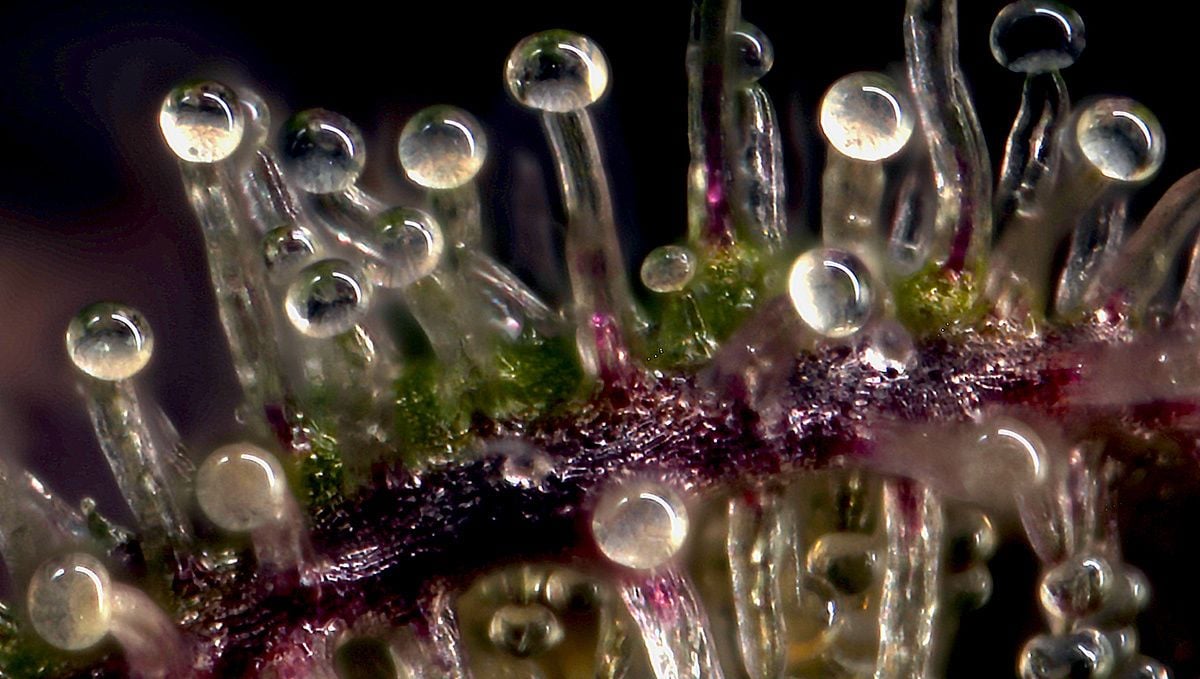
The majority of growers use basically three ways to determine when to harvest their cannabis plants, they are the breeder’s schedule, pistil colors, and state of the trichomes.
Breeder’s Schedule
The breeder’s schedule refers to the specified seed to harvest period but you should definitely not follow it. In most cases, the seed to harvest time specified by the breeder is when growing under optimal conditions and most home growers don’t have the equipment needed to grow under similar conditions.
Now, this doesn’t mean that your plants will take a lot longer, as a matter of fact, some plants may even take less than specified but it’s essential to have this in mind because your plant may still need a couple more days and by harvesting early you end up affecting the quality and quantity of the harvest.
Pistil Color
Some growers use the pistil’s color to know when to harvest but it’s not recommended to harvest only based on the pistils because it’s highly inaccurate. When around 60%of the colors are brown and curled in, it’s a sign that the harvest window is open, meaning that your plant is getting close to harvest time but still isn’t the right time.
Trichome State
The state of the trichomes is the best way to know the best time to harvest your cannabis plants. Trichomes have basically three states, either Clear, Cloudy, or Amber, and based on these colors you can even harvest for a slightly different effect but the downside is that, in order to zoom in and be able to see them clearly, you need a magnifier.
Trichome Colors and Effects
| Color of the trichomes | Content | Type of effect |
|---|---|---|
| Clear | Low levels of cannabinoids | Low potency |
| Cloudy | Highest levels of THC | Strong psychoactive effect |
| Amber or yellowish | Higher CBN levels | Mainly narcotic yet still slightly psychoactive |
As you can see in the table above, the different color of the trichomes refers to their content and will dictate the potency and type of high you experience so read along to learn a bit more about the tools that can help you determine the best time to harvest your cannabis plants!
3. Best Magnifiers To Identify Trichome Stages
There are several different magnifiers that may help you identify trichome stages but not all of them are great. Some of them will just not zoom in enough so to help, here are all the cheap and expensive magnifiers that will definitely not be a waste of money.
Handheld Magnifiers
Handheld magnifiers are super cheap and easy to use but don’t zoom in as close as you need, there also are some magnifiers that come with a built-in lens that zooms in closer but are not close enough. This means that handheld magnifiers allow you to see the buds closer but are not close enough for you to identify the color of the trichomes so it may give you an idea but won’t be 100% exact.
If you are going to use a handheld magnifier, try to find one that includes a lighting option. Identifying the trichome state with a magnifying glass can be a difficult job, but incorporating a light will make the job much easier. The best handheld magnifiers available for identifying the trichome stages are:
- JMH 30x Handheld Magnifying Glass with Light - This is a pretty handy and inexpensive option. With 18 ultrabright LED units offering 3 lighting color options, simple on/off operation with just 3x AAA batteries needed for power, and a large 3.15-inch diameter lens the JMH 30x Handheld Magnifying Glass with Light is one of the best handheld options available right now
- Wapodeai Magnifying Glass with Light - This is a dual magnifying option. The main lens offers 3x magnification, and the smaller lens allows for 45x magnification. This dual lens setup can be helpful in identifying the exact point of magnification and is a great handheld option.
But, to be totally honest with you guys, handheld magnifiers do not really offer anything that you won't find with a jeweler's loupe. Jeweler’s loupes are just a way better option for inspecting trichomes - so it's probably best to skip the handheld magnifiers all together.
If you can only find a magnifier, make sure to go for a magnifier with changeable heads which will allow you to zoom in more without spending too much.
Jeweler’s Loupe
Jeweler’s loupes are probably the best option because they’re designed to look at small details on gemstones so they’re not only cheap and convenient but are ideal to zoom in on trichomes.
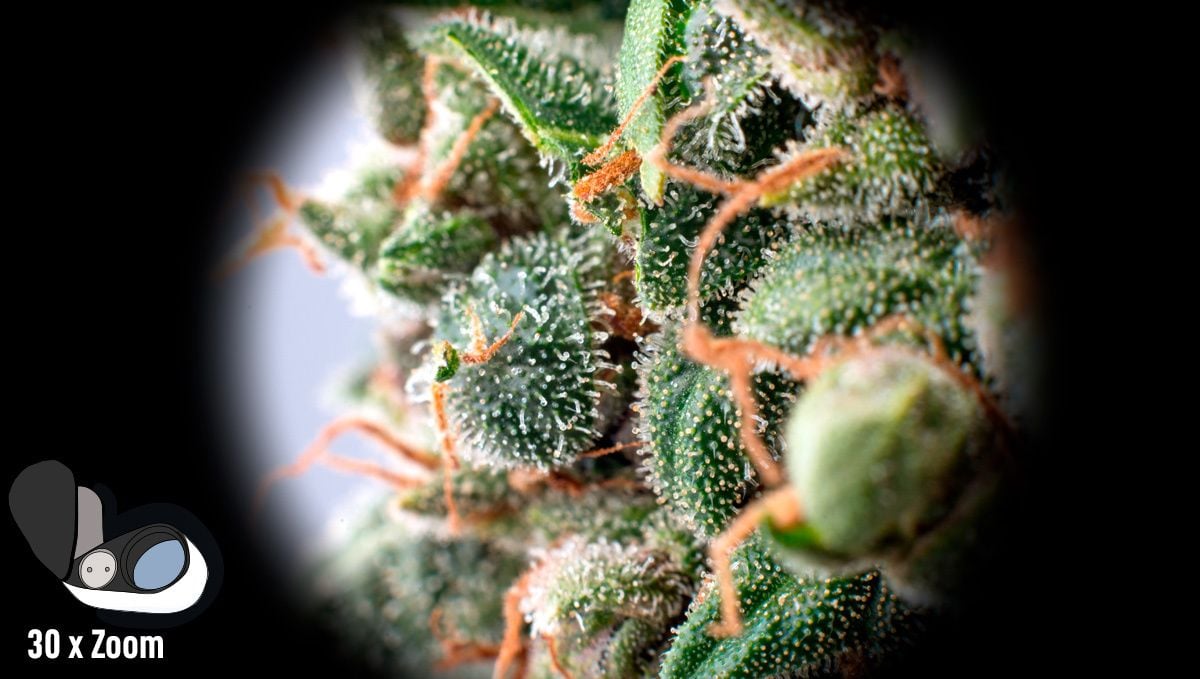
This type of magnifier can also be put on your smartphone’s camera lens and take pictures, this way you can check the trichomes with more time. Good quality jeweler loupes are very sturdy so if you buy a good quality loupe you’ll probably have it for years and years, so it’s definitely worth the investment. Again, you will want to grab a loupe that has an inbuilt lighting option. Without external light, it can be almost impossible to identify the trichome state.
If you are wanting to buy a jeweler’s loupe, but don't know where to find the best deals check out these options:
- 2 Pieces Jewelers Loupe 30X 60X 90X Illuminated Jewelers Eye Loupe - Coming in at less than $15, this option is perfect for the novice grower. With multiple magnification levels, an inbuilt light, and 2 separate magnifiers, it offers everything you will need.
- 2 Pieces Loupe Magnifier, 30X 60X Illuminated Jewelers Loupe Magnifier with LED Light - Another two-piece option, but in a slightly different style. Although this doesn't offer the 90x magnification option, you would very rarely actually need to inspect your buds with that intensity of magnification. This setup might actually suit cannabis cultivation a little better than the previous option, but does come in a few dollars more expensive. It is still incredibly cheap though.
- 10X 15X 20X 25X LED Magnifier Illuminated Double Eye Glass Jeweler's Loupe - This one is a little different from the last offerings, as this is an eyeglass setup instead of being handheld. This allows you to use both hands to manipulate the plant and can be easier to find the correct focal distance to see the trichomes clearly.
Smartphones
Smartphones can be of great help when talking about identifying trichome colors, probably being the most common because most growers already have one. Despite the picture quality and ability to zoom in may differ from phone to phone, you may still get an idea of when to harvest with your smartphone’s camera, especially if it has a macro mode or something similar.
Just remember that for the best pictures it’s recommended to go with optical zoom instead of digital zoom but most smartphones will do a great job so there’s no need to go buy a new phone if you already have one.
Tips for taking better trichome pictures
- Each camera is different so try different settings until you find what works for you.,
- Take a lot of pictures, this way you’ll have more photos to analyze and make the right choice.
- Try taking photos closer, further, and from different angles in case some of the photos are not clear enough.
While most mid to high-end smartphones usually have a macro photo setting (which allows for high magnification, and closeup photography), many low-end options do not. Even the best smartphones in the world will sometimes struggle to focus close in enough to grab a good shot of the trichomes. Thankfully, there are some really inexpensive options out there to boost smartphone camera capabilities, and these work great for checking out trichomes.
- KINGMAS 3 in 1 Universal Fish Eye Lens + Wide-Angle Lens + Macro Clip Camera Lens Kit - This is the most budget-friendly option available right now, but don't let the cheap price fool you into thinking it's a useless piece of kit. The macro lens attachment actually does a really decent job of magnification. If you are on the hunt for a very cheap option then check this one out.
- Phone Camera Lens Kit 10 in 1 for iPhone Samsung Pixel Android, 22X Telephoto Lens, 0.62X Super Wide Angle Lens&25X Macro Lens - Now this set is a little more expensive, but as it comes with 10 different lenses the price jump is no huge surprise. The macro lens here is 25X, which makes it perfect for trichome identification.
Small Tabletop Microscopes
Small microscopes can be hard to use if you've never used one but nowadays you can find microscopes that connect to your laptop or smartphone via USB, making them one of the best choices in this list.
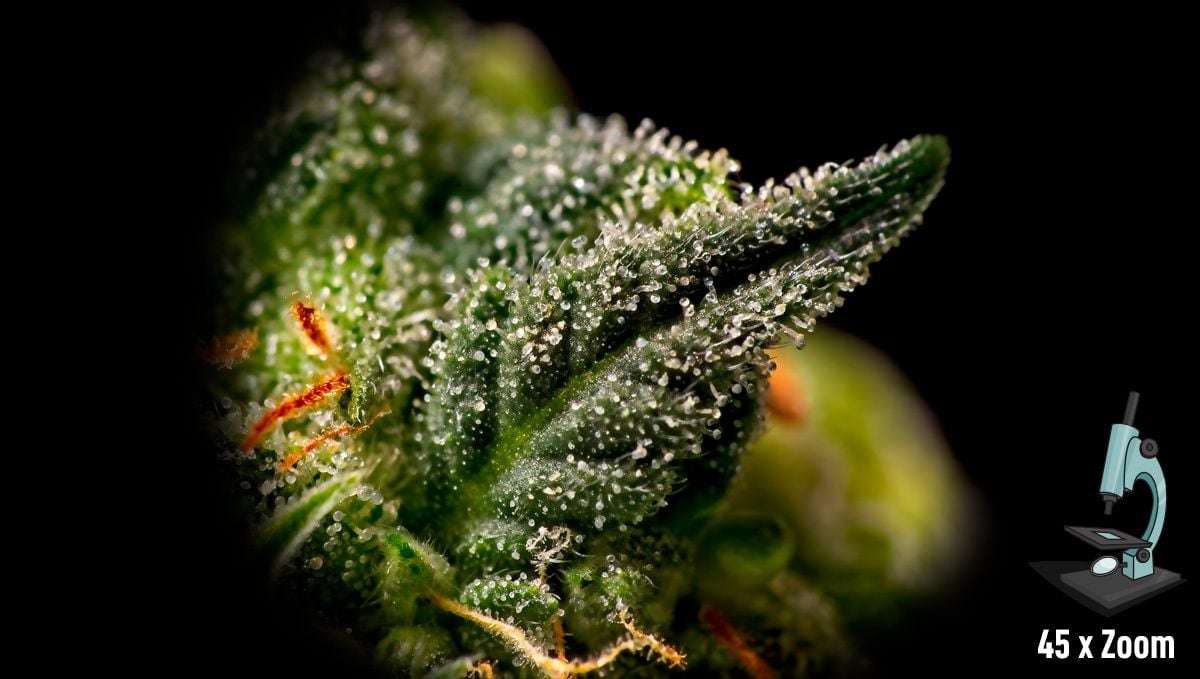
The downside being that there are a lot of different microscopes so you not only have to make sure you buy the right one but also that your smartphone or laptop supports it.
Portable Microscopes
Portable microscopes are tiny pocket microscopes and are relatively cheap. This type of microscope can be used alone or with a smartphone and not only allow you to take photos but also film the trichomes so it can be used as an upgrade to the smartphone’s regular macro mode. Just have in mind that all smartphones are different so make sure to look for a portable microscope that fits your smartphone. Our recommendation for a handheld microscope is:
- STPCTOU Wireless Handheld Digital Microscope 50X-1000X Portable Mini WiFi USB Microscope Camera with 8 LED Lights - This is actually the best tool for trichome identification that we have ever used. It connects to any smartphone or computer, has a powerful light, is easy to focus, and has video and still image capturing capabilities.
Big Microscopes
Regular big microscopes (which can be connected via USB too) are great for looking at the trichomes but can be hard to use because you will need to cut off a part of the bud or leaf in order to be able to inspect the trichomes.
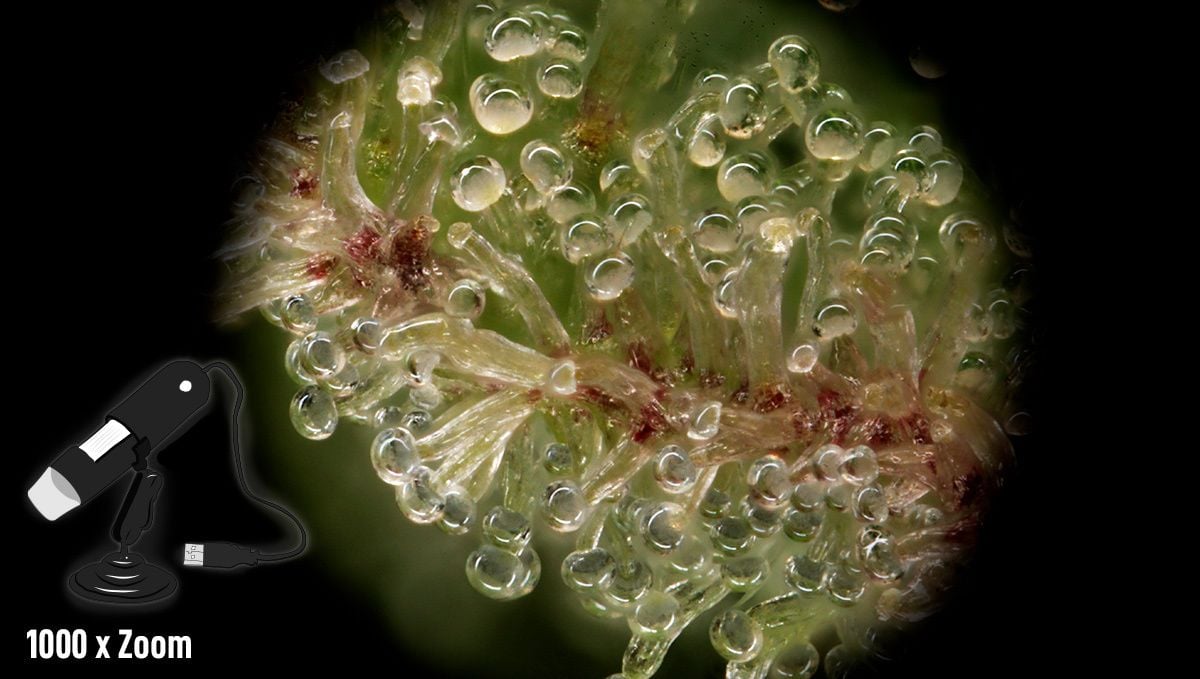
So despite being among the best choices, it may not be as convenient as the other options due to being expensive, big, and not super easy to use.
4. What's The Best Tool To Check On Trichomes?
Now that you know more about the main options, it’s time to make a choice. First of all, it’s essential you know that there’s no best choice because every grower has a different need and budget. For the average home grower, the small microscope would be the best choice because it’s fairly cheap and allows you to take high-quality video and photos, so they’re definitely worth it (remember that you need a good smartphone).
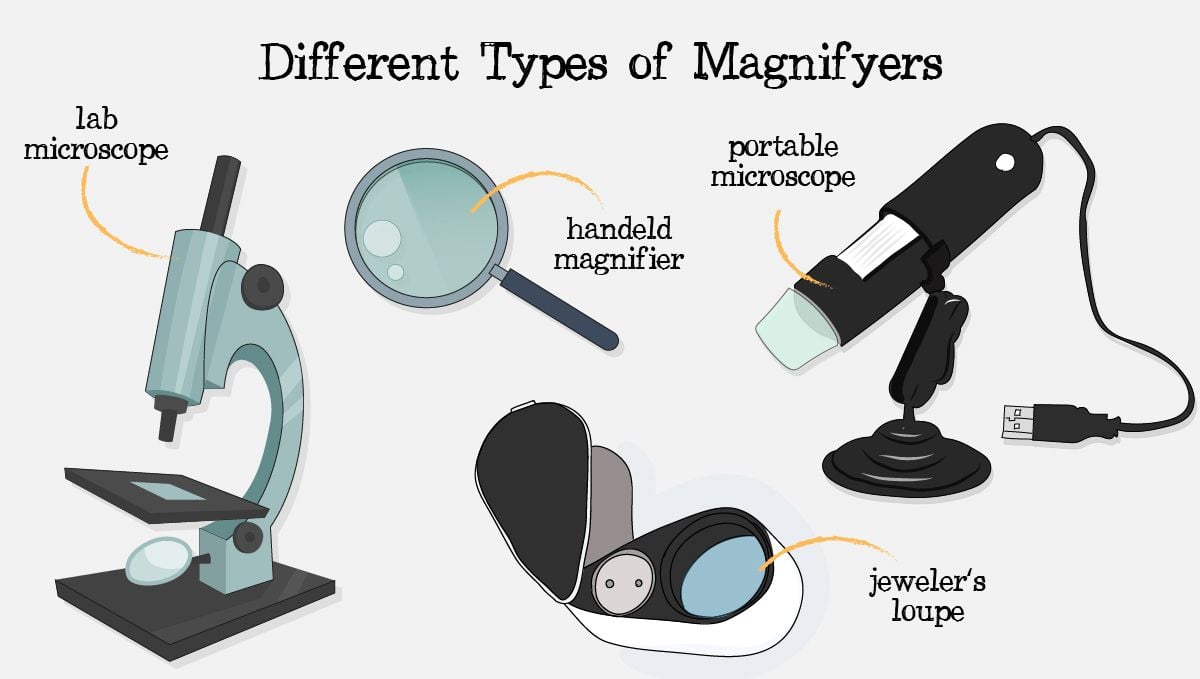
For commercial or professional growers the best option is either a professional camera or a big microscope because despite being expensive, they will provide the best quality photos out there. And, for those of you who want to harvest at the right time without spending any money at all, a regular loupe or jeweler’s loupe will definitely get the job done, although it may not be as easy as with a professional microscope, it will definitely help you out.
5. In Conclusion
Even though you can harvest great flowers without even checking the trichomes, it’s highly recommended because it allows you to kind of adjust the type of high to your needs. So despite not needed to grow good cannabis, the magnifiers mentioned in this article will definitely make your cannabis experience much better, so make sure you try to experiment with the different trichome states!
If you use any kind of magnifier tool to know the best time to harvest, feel free to help fellow growers by sharing what’s your magnifier of choice and what’s your preferred cloudy/amber ratio in the comment section below!








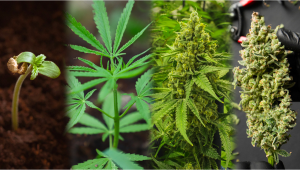
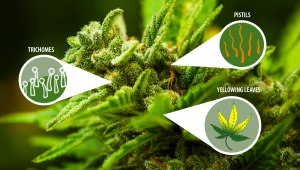



Comments